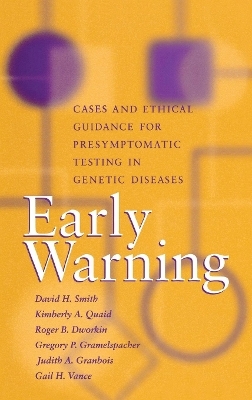
Early Warning
Indiana University Press (Verlag)
978-0-253-33401-5 (ISBN)
- Lieferbar (Termin unbekannt)
- Versandkostenfrei innerhalb Deutschlands
- Auch auf Rechnung
- Verfügbarkeit in der Filiale vor Ort prüfen
- Artikel merken
"This timely, well-written book brings together the collective experience of experts from the fields of medicine, psychiatry, religious studies, bioethics, and molecular genetics in an effort to develop coherent guidelines for the counseling of potential sufferers from genetic diseases." —Journal of Religion and Health
This book presents 29 case studies that identify the most important ethical issues that are likely to emerge from new technologies of genetic testing and develops a series of guidelines based on those case studies. By providing the clinical origins and rationale behind each of its recommendations, the book will help readers think through the ethical issues and will assist them in the development of additional guidelines.
Roger B. Dworkin is the Robert H. McKinney Professor of Law at Indiana University School of Law-Bloomington and Nelson Poynter Scholar and Director of Medical Studies at Indiana University's Poynter Center for the Study of Ethics and American Institutions. Dworkin, who has previously served as Professor of Biomedical History at the University of Washington School of Medicine, is an expert on the relationship between law and the biomedical sciences. He is the author of Limits: The Role of the Law in Bioethical Decision Making, and numerous articles in the field as well as the co-author of a leading casebook on law and medicine. Gregory P. Gramelspacher, M.D. is the founder and Director of the Program in Medical Ethics, Indiana University School of Medicine. He is a general internist with research interests in the areas of death and dying, advance directives, and ethical implications of the human genome project. Judith A. Granbois joined the staff of The Poynter Center for the Study of Ethics and American Institutions in 1980. She has taught writing and ethics courses at Indiana University and is the co-author of articles on various topics in biomedical ethics. Dr. Kimberly A. Quaid is Co-Director, Clinical Associate Professor of Medical Genetics and Psychiatry and Clinical Associate Professor of Medical and Molecular Genetics and Psychiatry at the Indiana University School of Medicine. Dr. Quaid coordinated one of the first programs in the country to offer predictive testing for Huntington disease at Johns Hopkins Hospital. She works with families at risk for Huntington disease, Gerstmann-Straussler-Scheinker disease and Alzheimer disease both in providing education and testing to patients and their families as well as doing research on the clinical outcomes of testing and is internationally recognized for her work in the development of ethically sound protocols for genetic testing. She has published numerous journal articles and is author of "Implications of susceptibility testing with Apolipoprotein E," in Stephen G. Post (ed.) Ethics, Genetics and Alzheimer Disease. David H. Smith is Professor of Religious Studies at Indiana University and Director of The Poynter Center for the Study of Ethics and American Institutions. He is a founding member of the Hospice of Bloomington and the Association for Practical and Professional Ethics. His publications include Entrusted: The Moral Responsibilities of Trusteeship and Health and Medicine in the Anglican Tradition: Conscience, Community, and Compromise. Dr. Gail Vance is an Assistant Professor in the Department of Medical and Molecular Genetics. Dr. Vance joined the Indiana University School of Medicine faculty in 1992, after completing fellowships in clinical genetics and cytogenetics. Dr. Vance is board certified in Pediatrics (American Board of Pediatrics, l990), Clinical Pathology (American Board of Pathology, l989), and Medical Genetics and Clinical Cytogenetics (American Board of Genetics, 1993). Dr. Vance developed the Indiana Familial Cancer Program in the Department of Medical and Molecular Genetics in l993, to provide genetic counseling and genetic testing to individuals with a high risk for the development of cancer. She is also Assistant Director of the Cytogenetic laboratory.
Introduction
Cases
Case 1 — Paul and Michael
Case 2 — Father and Son
Case 3 — Sarah
Case 4 — Ann and Jack
Case 5 — Carol
Case 6 — Kirsten and David
Case 7 — Robert
Case 8 — Mr. H
Case 9 — Natalie
Case 10 — Mary Ann
Case 11 — Maurice
Case 12 — Mr. L
Case 13 — Mr. Crawford
Case 14 — Mr. and Mrs. Anderson
Case 15 — Jimmy
Case 16 — Harriet
Case 17 — Charley
Case 18 — Mr. and Mrs. B
Case 19 — Julie
Case 20 — Barbara
Case 21 — Doug
Case 22 — Uncle Lee
Case 23 — Emily
Case 24 — Mrs. K
Case 25 — Ruth
Case 26 — Jackie
Case 27 — Aunt Mary
Case 28 — Scott
Case 29 — Mrs. Sawyer
Guidelines and Commentary
Guideline I
Guideline II
Guideline III
Guideline IV
Guideline V
Guideline VI
Guideline VII
Guideline VIII
Guideline IX
Guideline X
Guideline XI
Glossary
References
| Erscheint lt. Verlag | 22.11.1998 |
|---|---|
| Zusatzinfo | 4 figures |
| Verlagsort | Bloomington, IN |
| Sprache | englisch |
| Maße | 155 x 235 mm |
| Gewicht | 499 g |
| Themenwelt | Medizin / Pharmazie ► Medizinische Fachgebiete ► Medizinethik |
| Studium ► 2. Studienabschnitt (Klinik) ► Humangenetik | |
| Studium ► Querschnittsbereiche ► Geschichte / Ethik der Medizin | |
| ISBN-10 | 0-253-33401-2 / 0253334012 |
| ISBN-13 | 978-0-253-33401-5 / 9780253334015 |
| Zustand | Neuware |
| Haben Sie eine Frage zum Produkt? |
aus dem Bereich


